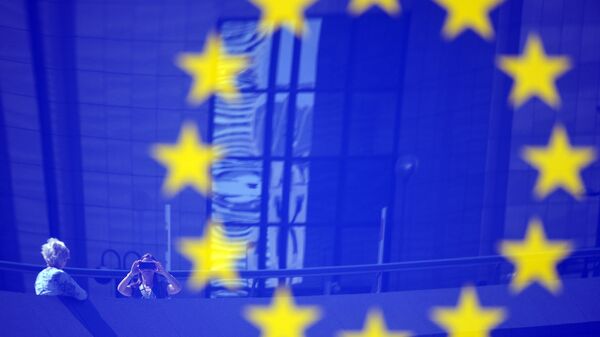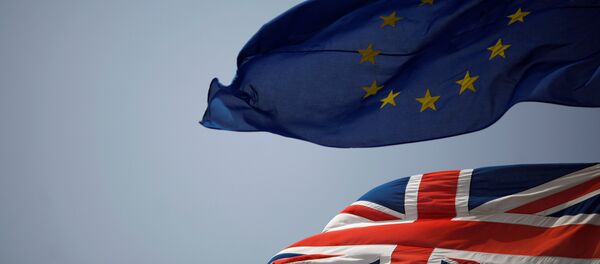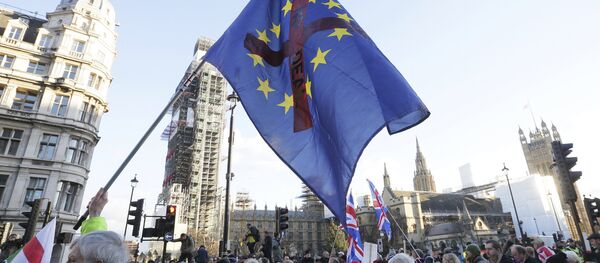The Maastricht Treaty, which was signed on 7 February 1992, entered into force on 1 November 1993. It led to the creation of the single European currency, the euro, and is currently one of the two treaties which together form the constitutional basis of the European Union.
Sputnik discussed the significance of the Maastricht Treaty with Katie Hopkins, a UK-based journalist and political commentator.
Sputnik: In your view, what effect did the creation of the European Union have on its member states?
Katie Hopkins: I think it's been many things. But as here in the UK, from the British perspective, it's been a huge success; there was something of a triumph about it because at the time of the signing, the Brits managed to negotiate back some elements of it. So, we managed to opt out, for example, of the economic and the monetary union parts of the Maastricht Treaty.
But it's also been part of the disaster for the UK; the Maastricht Treaty really sits as the reason why we have Brexit today, because of the opposition to the signing of the Maastricht Treaty. That began UKIP, and, of course, UKIP went on to be the fundamental reason why we ended up with Brexit in this country.
So, I think for many people here in the UK, it began a process of, as it laid out, ever closer union; and that's been specifically the point of tension and conflict for both Britain and other countries throughout Europe.
Sputnik: Have some of the member states benefited from the signing of that treaty?
Katie Hopkins: Of course. I mean, even if I am to declare my hand, I'm an ardent and passionate Brexiteer, I was part of the campaign to get the British sovereignty back to Britain and to leave the EU.
So, there're a lot of reasons why Remain and others who wish to stay in the EU are campaigning the way they are, because they see these benefits; and they feel them in their daily life.
READ MORE: Theresa May Determined to Deliver Brexit on 29 March — PM's Spokesman
Sputnik: As time passes by, have these states been able to maintain their cultural identities, or do you feel there's something that's being threatened by the European Union?
Katie Hopkins: I think so. I feel that strategically, the big players can see the advantages — they can see free movement, they can see the economic benefits, whatever; but on the ground level, with people that are just going about their daily lives, what they see is specific identifiable and actually threatening changes to their country.
This idea that countries are changing dramatically, the dynamics and the demographics of the population are changing dramatically, and that these countries are no longer as safe as they were because their culture is changed, certainly from the British perspective, it would be an Islamic culture and a sense of the Islamification of the UK.
I just got back, last week actually, from a place called (Saval town) in the UK that has a 96 per cent Muslim population, there're only four percent of white British people left in that town. That just gives you an example of the cultural change that has been brought about by the opening up of our borders and these sorts of things.
Sputnik: Let's get back to the European Union. Is it as effective as it was hoped it would be at the time it was formed?
Katie Hopkins: I would have to say that can't possibly be the case. If you just take a brief scan across Europe, you'll see so many of these countries in trouble. Greece has been crippled by the nature of the financial programme it was supposed to adhere to at the behest of the EU; I believe Italy is just about to or has formally declared a recession.
READ MORE: Top Brexiteer MP Savaged Online for Falsely Claiming UK Received No Marshall Aid
There've been so many problems with monetary union in the sense that joining a single currency sounds like a magnificent thing, it sounds like a great idea; but, of course, joining a monetary union, joining the euro, means that you lose certain things. Eurozone members have lost their important policy levers: they can no longer control their interest rates, for example, or encourage domestic spending.
They no longer have an ability to differentiate between the treatment of one country that's doing very well and one country that's doing poorly.
So, there are all sorts of reasons why monetary union has been one of the big drivers of what I would say is the failure of the EU. I don't know how much longer the EU will continue.
Sputnik: Do you think that the member states actually have benefited economically from being part of the EU, or in any case, some of them?
Katie Hopkins: Yes, absolutely. It would be completely unbalanced of me not to refer to the 3.1 million Brits that enjoy the export trade with the EU; it would be completely remiss to not notice the other benefits too, actually. [These are] sort of security benefits, we work together, we cooperate at the level of international security across Europe and that confers significant benefits to us.
And I think that really boils down to the fact that this was an ambitious project to join countries together but it didn't actually know where it was trying to end up.
The European Union didn't really know where it was headed, and as such you've now got this massive cleavage, this huge break between those who want an ever closer union, including the EU Army, and those who feel that the sovereignty of the nation state is threatened to the point where it's no longer able to stay part of the union at all.
Sputnik: Speaking of Brexit, what do you think is the most important lesson 27 years after the creation of the Treaty on European Union?
Katie Hopkins: I suppose I go back to my military training, where you had to have a clear aim. The idea with the military is you know what you're doing and why you're doing it: your clear aim what and why.
The views and opinions expressed by Katie Hopkins do not necessarily reflect those of Sputnik.




